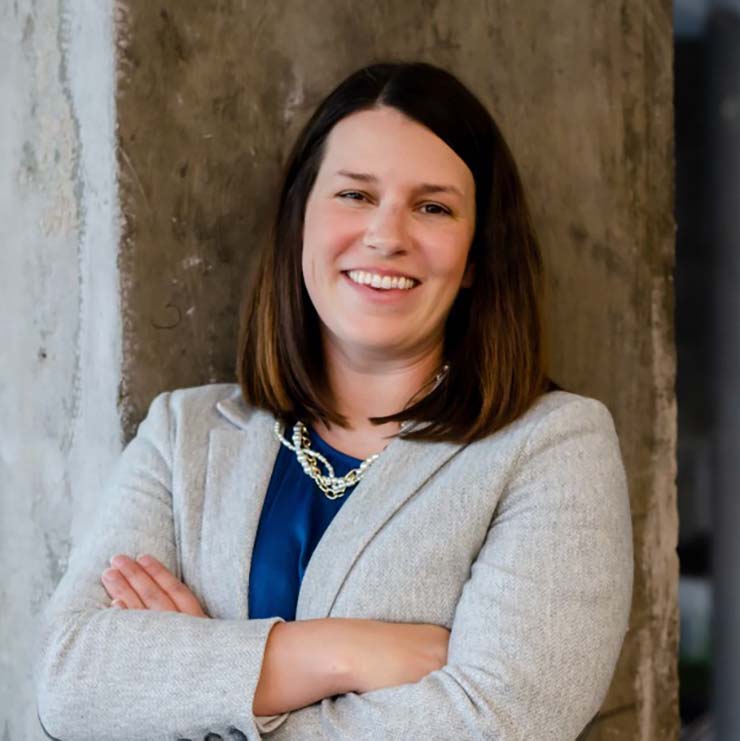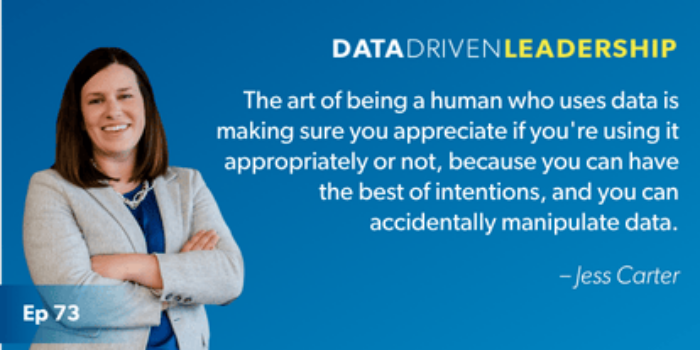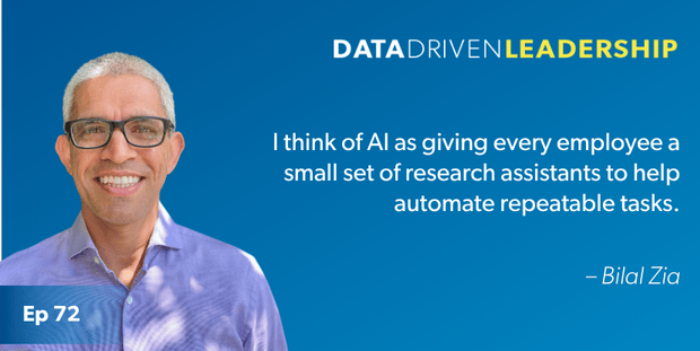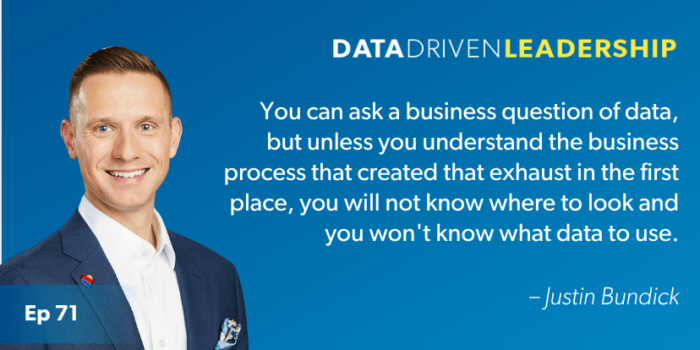

Transcript
Jess Carter [00:00:01]:
The power of data is undeniable and unharnessed. It's nothing but chaos.
Speaker 1[00:00:06]:
The amount of data, it was crazy.
Speaker 2 [00:00:08]:
Can I trust it?
Speaker 3 [00:00:09]:
You will waste money.
Speaker 4 [00:00:11]:
Held together with duct tape.
Speaker 5 [00:00:12]
Doomed to failure.
Jess Carter [00:00:13]:
This season, we're solving problems in real-time to reveal the art of the possible. Making data your ally, using it to lead with confidence and clarity, helping communities and people thrive. This is Data Driven Leadership, a show by Resultant.
Hey guys, welcome back to Data Driven Leadership. I'm your host, Jess Carter, and today I have a really cool announcement I'm excited about and I'm going to share some of my favorite themes or reflections from season three.
Jess Carter [00:00:42]:
The first one, the exciting announcement is I wanted to share that Dr. Curt, who is our director of education at Resultant, he's going to be doing an education miniseries on Data Driven Leadership, so you'll see that coming up soon. Now, you might ask, who is this Dr. Curt? Dr. Curt Merlau isn't just a senior director at resultant. He's a dynamic professional with a really interesting and diverse background. I love hearing him talk through that. He has his roots in youth work and he has been a really effective educator.
Jess Carter [00:01:14]:
He is a key contributor to various educational organizations and he currently leads a team of education experts steering Resultant’s mission expertise across early care and education, K-12 twelve, post-secondary education. Now, in the last three seasons of Data Driven Leadership, we've introduced episodes spanning tons of industries and topics, data warehousing, algorithms, science, BI, EDWs, trying to understand the intricacies of how data driven leadership looks and feels across this huge span of our economy, really. And the goal was to help inspire data-driven leaders and help them feel more brave to understand what are other people struggling with. You're not alone. And how do you actually make a difference with data? We don't want it to be intimidating. We don't want anyone with an imposter syndrome, and we want everyone to know that they can be a data-driven leader.
This miniseries, though, on education, gives us a chance for the first time to really peel back a layer of the onion a little bit more in one expertise: education. And help those either in that space get a little bit more practical and see perhaps maybe a different advantage or perspective. But it also helps those outside of the education space to better appreciate its challenges and look for parallels in our own industries.
Jess Carter [00:02:38]:
So I'm super excited to see how valuable you all find this and what you find most interesting as we all get to learn a little bit more about education, a space that Curt knows very, very well and I'm not sure I've met someone more passionate about.
So some of the things that you guys are going to dive into in this miniseries, we're going to understand more about the intricate relationship between data, IT, and education policy. If you are anywhere in the public sector or read much about it, there's this term called evidence-based policy. That concept in the last ten or 15 years has been, do we have data that should be driving this policy change when we go to make a law change? And so there's been a lot of changes in education policy, and it'll be really interesting to learn more from Dr. Curt and his guests about that. As you listen, you're going to better understand a lot of the aspects of education policy that are often what I call behind the curtain. So how is policy influenced? What are the players around that policy? What role does data often have or technology often have in influencing a potential policy or reforming a policy? You'll start to understand more from those guests around policy formation as a kind of theme, which I'm really excited about.
Jess Carter [00:03:58]:
So in season three, we talked a little bit about workforce and unemployment, which is another federally administrated, and sometimes there are state programs that accompany it, program that is nearly 100 years old. Education is similar. There's administration of an education department throughout each state. And this miniseries is going to help us really understand the pivotal role that the state education agencies play in the realm of IT and data. Most of us have either been a student or parented a student, and that's our understanding of the system. I think this is going to step back and help us understand at a larger scale, how do states make sure that the education that is being provided to citizens is sufficient for the future careers that those children and students will one day be in the workforce. And so it's really exciting to me to see, how do you innovate in that space, what's working and really what's not.
Jess Carter [00:05:00]:
We'll delve into those intricate dynamics of how people, processes, and technology intersect with policy and aim to provide some really comprehensive understanding of those challenges. There's going to be a lot of nuance. I think that that makes sense in this space, and I think that we've got guests that are lined up to really help unpack that for us. So stay tuned for a captivating exploration into education with Dr. Curt Murlau.
Now, I'm going to pivot and do some reflections on season three as we wrap it up. What I did last time, I really enjoyed and heard some good feedback about what's your one takeaway from each episode in your season? So we're going to just follow that format. So we started season three with episode one was Leslie Pagel from Authenticx.
Jess Carter [00:05:45]:
She was talking about how providers are using AI to listen to service call logs and gain unprecedented insights and refining patient care. The lesson here for me is technology can genuinely transform how we deliver healthcare services, making them more personalized and efficient. I loved hearing Leslie expound on how this data, just recording customer calls, was sort of this unused, untapped resource in data that they could use to better inform their processes and lead to better, not just better interactions with patients, but better outcomes.
In episode two, we got to talk to my CEO at Resultant Greg Layok, and he shared the importance of data-driven approaches and leadership. Greg emphasized putting people over processes and using agile principles as a guiding light for behavior, not just how you develop software. And so I learned a lot about leadership from him, about how it's about people and adaptability. I really loved his comments on AI. I thought they were super insightful and really aligned to my understanding of the highest and best uses of it, especially in the last year, while it's been on the front page of the newspaper often, and there's a lot of fears around it.
Jess Carter [00:07:06]:
And I think he really gave some key practical tips about how to leverage it thoughtfully and not be afraid of it.
In episode three, how cool, elephants showed up in the podcast and we got to talk to Dr. Wall about data-driven conservation. This is so cool to me. From combating poaching, ivory poaching, to bridging gaps between ecologists and policymakers, he helped us understand the impact of data in saving our environment. And so I think my favorite part of that entire thing was when he explained how they were using drones to safely move elephants away from precious farmland, sort of de-escalating conflict between elephants and humans. How innovative.
Jess Carter [00:07:49]:
It's something I never would have thought of, and I think it's so neat. Episode four Tarush Aggarwal, CEO of 5X, shared some insights on the evolution of the data industry, sort of through his reflections on his own career. And he talked about the rise of a data generalist, how we kind of had generalist softwares. Then we started creating all these specialties, data engineering, architecture, BI,science, et cetera. And now there's maybe this return to a data generalist, people who can do more of those things and integrated solutions and the importance of effectively managing your data. I do think if you listen to that episode, what I love about it is the way that I call it sense-making, the way that he reflects on the moments in his career and what he took away from those moments or seasons. I think anyone could listen to that and kind of do that same exercise for their own journey and walk away with some important learnings of things that they learned and wanted to keep as they move forward in their career and maybe some lessons they learned that they want to release from themselves moving forward.
In our festive episode, Chelsea Gill, Resultant’s VP of marketing shared some reflections with me and resolutions for the new year, and I thought that was just a really fun episode. Did you hear us sing? Yes.
Jess Carter [00:09:15]:
Is Chelsea forever embarrassed by that? Also yes. But it's also showing that data is part of our everyday lives. We're all thinking about it, and a little holiday cheer doesn't hurt. So for those of you who listen to us sing we do, though, seriously apologize.
Episode six I got a little bit geeky and went on a riff, rant, whatever you want to call it, about the New York Times lawsuit against OpenAI and Microsoft and the long-term implications that companies need to have about how they protect their data, how they allow policies around how you use OpenAI and whether that use is protecting your data or not, and how these legal matters may impact your business. Copyright and ethics should always be at the forefront of what we're thinking about. We are humans first, and so how we protect the things that we create matters and how we draw the line between what we created and what AI creates really matters.
Peter Krombah joined us for episode seven to discuss priorities for data-driven leaders in the public sector, especially coming from the health background in the last five years, just some minor changes in that space.
Jess Carter [00:10:25]:
The lesson here for me was building a community with your team that fosters camaraderie, understanding, and diverse skill sets leading to success and your outcomes. One thing that really mattered to me is you can't bring forward technology transformation on your own in a silo. You need the people around you, and usually the people that you think you need is a smaller subset of the people you actually need. So drawing that circle a little bit larger around your influencers of your initiatives is really important.
Episode eight we navigate the intersection of technology and business with Steven Graves Donato's Pizza CIO. You just have to listen to the episode, guys. I don't know how to reflect the number of lessons that I took out of this episode. I mean, what a wise, sage, funny, humble leader.
Jess Carter [00:11:14]:
He walked us through his journey from getting retail e-commerce around to where he is today and he just navigated so many changes with grace and also admitted when he didn't. And the takeaways I had were much more about the character of a data-driven leader, the moral compass of a data-driven leader, and somebody who just has a lot of humility and fun.
Tiny Bird was on our next episode. The co-founder of Tiny Bird, Jorge Sancha, joined us for episode nine and we were talking about real-time data and the impact on businesses. And if you remember, a lot of the work that they were doing is around data that changes quickly in industries that need to understand how that data is changing. I thought that that was super interesting. If you're in an industry that's moving fast, you have to have near-real-time analytics.
And then we jumped in with Preston Howell, Resultant client success leader, to talk about financial literacy.
Jess Carter [00:12:15]:
And we kind of got a little vulnerable with you all and talked about our open-book management approach, The Great Game of Business, the financial literacy that we have, and the encouragement to other data-driven leaders to just tie incentives for people to the business objectives that you have is a simple concept, a little bit harder to implement and it might take you a few runs, but it's well, well worth it.
On episode eleven, Nick Elam, the mind behind the Elam Ending, I got to hang out with him and I just thought it was so interesting to understand the role of data in sport innovation. So understanding his patience that he had as he was working through this, it took a long time to start to introduce this potential change to a sport. Feedback and focusing on outcomes as critical parts of your leadership journey. I really liked when he admitted that the first thing he did and the first tool he used to start analyzing data was a Word doc. I think most of us would blush when we say, oh, it wasn't Python or Excel or whatever. And the point was, nothing stopped him.
Jess Carter [00:13:29]:
He didn't find it limiting. He didn't get in his head about where to begin. He was watching a game, he had some thoughts and he started writing things down. I think if all of us did a little bit more of that, we would see a lot more data-driven leadership and a lot better outcomes in the world. So don't be afraid to grab a napkin and start sketching out some things that you're noticing.
Finally, we ended the season other than this episode with Josh Richardson, who joined me to talk about Pivot, Indiana Recommendations Engine. And for me that was really meaningful because I got to work at that account, I don't know, ten years ago. And it was neat to see this idea that Josh Richardson had come to fruition, and all of the different people that showed up in that story to show up and help him get there, I think was really inspiring for me.
Jess Carter [00:14:20]:
So whether you're shaping employment strategies or guiding personal career paths, the future is undeniably rooted in the power of data-driven decisions and the fact that governments are trying to find ways, and are succeeding in finding ways to put more data in the hands of their constituents to make better decisions with their time, energy, and money. I mean, what more could we want from good government, in my opinion?
Now for the grand takeaway of season three, whether it's leadership, conservation, technology, basketball, there's one resounding lesson that echoes through each episode. Data is not just a tool. It's a transformative force, shaping our present and defining our future.
As we navigate the dynamic landscape of data-driven leadership, one thing becomes crystal clear to me, is the power of data extends far beyond the business realm. It is a guiding force for positive change, innovation, and success in every facet of our lives.
Insights delivered to your inbox





